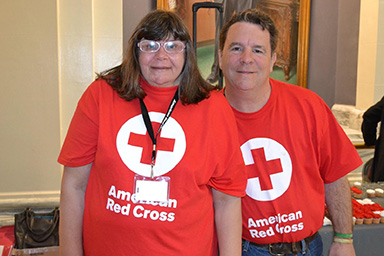Planning for Emergencies in Oklahoma: Investing in Partnerships (OK UCEDD)
April 25, 2016

|
| Renetta and David Bridges, new Red Cross volunteers |
Oklahoma is a beautiful state, but, as in other areas of the country, unexpected events can lead to emergency conditions in people's lives. With tornados, floods, ice-storms, and earthquakes, people who live in Oklahoma need to be ready to handle extreme natural events. Mother Nature can create emergencies for everyone, including people with intellectual/developmental disabilities (IDD). However, few Oklahomans with IDD have emergency plans in place. OKSAN (Oklahoma Self-Advocacy Network), a collaborative project facilitated by the Oklahoma UCEDD, has partnered with the American Red Cross to create an emergency preparedness curriculum by Oklahoma self-advocates for Oklahoma self-advocates. OKSAN has produced a workbook to accompany the training entitled "Let's Make a Plan: Getting Ready for an Emergency." Beginning in the spring of 2016, self-advocates will provide training in emergency preparedness for 120 self-advocates in 19 counties in Oklahoma. OKSAN plans to continue their collaboration with the Red Cross, and extend partnerships with police and fire departments across the state.
OKSAN is a collaborative project of Oklahoma People First, the Center for Learning and Leadership/Oklahoma UCEDD, and the Oklahoma Developmental Disabilities Council (ODDC). Responding to the request of self-advocates to "teach us to do it ourselves," OKSAN created a training committee composed of self-advocates to develop the Self-Advocate Leadership Training (SALT) curriculum. Following the success of SALT, ODDC approached OKSAN about creating an emergency preparedness curriculum that would be developed and trained from the perspective of people with IDD.
The Emergency Preparedness Training Committee employed the principles and process of curriculum development used in SALT. Self-advocates are involved in every stage of development, revision, and training. The training committee began meeting in September to identify key issues and possible partnerships. Self-advocates recognized the need to receive emergency preparedness training from a nationally certified organization. OKSAN established a partnership with the Central Oklahoma Chapter of the Red Cross, who agreed to provide the training. Committee members then began the process of adapting the material to the needs and perspective of people with IDD into a two-hour training.
The training covers what to do in case of fire, flood, tornado, earthquake, and winter weather. The goal of the training is to have participants complete a personal emergency plan in the "Let's Make a Plan" workbook. Other information includes how to prepare an emergency Go Kit, personal checklists of needed medications, supplies, and adaptive equipment, lists of important phone numbers of first responders and utilities, and options for pets in emergency situations.
Partnering with the Red Cross on emergency preparedness training has been a tremendous success. Carol Irwin, Red Cross Training Coordinator, said, "I wasn't sure what to expect with this training. We don't have a lot of experience training people with disabilities, but all of the trainers were impressed by the people who attended the training." She added, "We are now excited about partnering with this group to train across the state." Laura Stutsman, self-advocate, said, "The training was awesome. We can do this. I think we were all a little afraid of trying this, but the trainers were awesome and easy to understand." The Red Cross Training Coordinator will continue playing an important role in partnering with OKSAN trainers by assisting in reviewing training materials and coordinating with local Red Cross chapters to take part in the training.
Through its community education efforts in SALT I, emergency preparedness training, and the curriculum now in development for SALT II, OKSAN has found the value in investing the time for self-advocates to develop their own curricula and materials, train the material to other self-advocates, and improve the training based on the feedback from participants. Nancy Ward, president of Oklahoma People First and a chair of OKSAN, said, "Most of the trainings I have attended have not been geared to my needs and were not generated from my own experiences and perspectives. I also think peer trainers are more effective." After the positive experience of the Red Cross partnership, Joe Honeycutt, self-advocate, is receiving training to become a First Responder. To do this community education work, OKSAN also needs the respect and trust of funders and supporting agencies. The first emergency preparedness training takes place April 16th, 2016. The emergency preparedness workbook will be available in English and Spanish on the websites of the Center for Learning and Leadership and Oklahoma People First when finalized.







